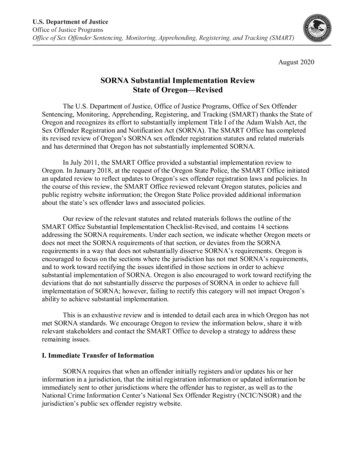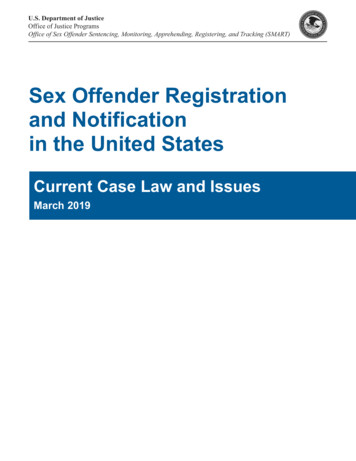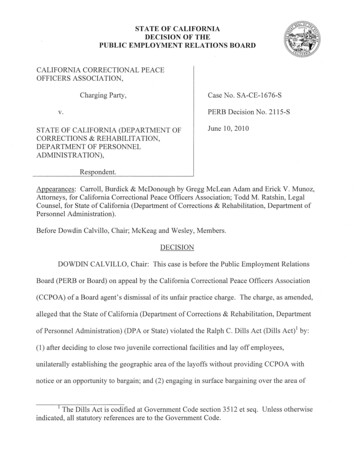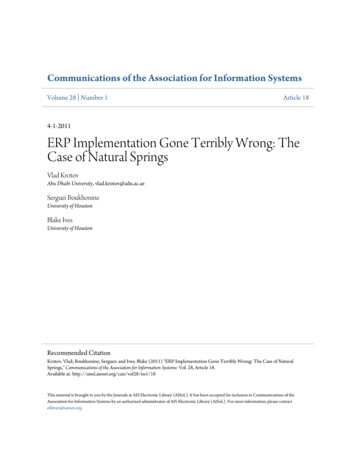
Transcription
August 2020SORNA Substantial Implementation ReviewState of Oregon—RevisedThe U.S. Department of Justice, Office of Justice Programs, Office of Sex OffenderSentencing, Monitoring, Apprehending, Registering, and Tracking (SMART) thanks the State ofOregon and recognizes its effort to substantially implement Title I of the Adam Walsh Act, theSex Offender Registration and Notification Act (SORNA). The SMART Office has completedits revised review of Oregon’s SORNA sex offender registration statutes and related materialsand has determined that Oregon has not substantially implemented SORNA.In July 2011, the SMART Office provided a substantial implementation review toOregon. In January 2018, at the request of the Oregon State Police, the SMART Office initiatedan updated review to reflect updates to Oregon’s sex offender registration laws and policies. Inthe course of this review, the SMART Office reviewed relevant Oregon statutes, policies andpublic registry website information; the Oregon State Police provided additional informationabout the state’s sex offender laws and associated policies.Our review of the relevant statutes and related materials follows the outline of theSMART Office Substantial Implementation Checklist-Revised, and contains 14 sectionsaddressing the SORNA requirements. Under each section, we indicate whether Oregon meets ordoes not meet the SORNA requirements of that section, or deviates from the SORNArequirements in a way that does not substantially disserve SORNA’s requirements. Oregon isencouraged to focus on the sections where the jurisdiction has not met SORNA’s requirements,and to work toward rectifying the issues identified in those sections in order to achievesubstantial implementation of SORNA. Oregon is also encouraged to work toward rectifying thedeviations that do not substantially disserve the purposes of SORNA in order to achieve fullimplementation of SORNA; however, failing to rectify this category will not impact Oregon’sability to achieve substantial implementation.This is an exhaustive review and is intended to detail each area in which Oregon has notmet SORNA standards. We encourage Oregon to review the information below, share it withrelevant stakeholders and contact the SMART Office to develop a strategy to address theseremaining issues.I. Immediate Transfer of InformationSORNA requires that when an offender initially registers and/or updates his or herinformation in a jurisdiction, that the initial registration information or updated information beimmediately sent to other jurisdictions where the offender has to register, as well as to theNational Crime Information Center’s National Sex Offender Registry (NCIC/NSOR) and thejurisdiction’s public sex offender registry website.
Oregon meets the SORNA requirements in this section.II. Offenses That Must Be Included in the RegistrySORNA requires that certain federal, military and foreign offenses are included in ajurisdiction’s registration scheme. In addition, SORNA requires that the jurisdiction capturecertain sex offenses, both offenses from its jurisdiction and from other SORNA registrationjurisdictions, in its registration scheme. SORNA also requires that certain adjudications ofdelinquency are included in a jurisdiction’s registration scheme.A. Oregon OffensesMost of the Oregon offenses for which SORNA requires registration are included inOregon’s registration scheme.However, Oregon deviates from SORNA requirements in that, under Oregon RevisedStatutes § 137.533, there is a procedure that allows certain misdemeanor sex offenders—whowould otherwise be required to register—be given “first offender” status. 1 This procedure is bymotion of the district attorney and provides that, if certain conditions are met, the offender isplaced on probation and a final judgment of guilt will not be entered. Upon the offender’ssuccessful fulfillment of the terms and conditions of probation, the court must discharge anddismiss proceedings against the offender. Since Oregon only requires registration uponconviction and release of an offender, these individuals are not required to register.The following SORNA-registerable offenses would be eligible for Oregon’s “firstoffender” status: § 163.415§ 163.445§ 163.465§ 163.467§ 163.472§ 163.575§ 163.687§ 167.008Sexual abuse in the third degreeSexual misconductPublic indecencyPrivate indecencyUnlawful dissemination of an intimate imageEndangering the welfare of a minorEncouraging child sexual abuse in the third degreeCommercial sexual solicitation (victim under 18)In addition to the above, Oregon deviates from SORNA requirements in that thefollowing Oregon offenses are not included in the state’s registration law but are registerableunder SORNA: § 163.413 Purchasing sex with a minor§ 163.432 Online sexual corruption of a child in the second degreeSection 137.533 applies when a person pleads guilty to or is found guilty of a misdemeanor other than drivingwhile under the influence or a misdemeanor involving domestic violence.12
§ 163.433§ 163.435§ 163.452§ 163.454§ 163.479§ 163.700§ 163.701Online sexual corruption of a child in the first degreeContributing to the sexual delinquency of a minorCustodial sexual misconduct in the first degreeCustodial sexual misconduct in the second degreeUnlawful contact with a childInvasion of personal privacy in the second degreeInvasion of personal privacy in the first degreeB. Offenses of Other SORNA Registration JurisdictionsOregon deviates from SORNA requirements in that there are three circumstances inwhich registration for convictions for offenses committed in other jurisdictions, includinganother state, principal U.S. territory or tribe, is required. Registration is required only if anindividual is convicted of the following:1. An offense that equates to an Oregon sex crime; 22. An offense in which the other registration jurisdiction requires registration; or3. An offense that is equivalent to a qualifying offense under SORNA, regardless ofwhether or not the offense is defined as a sex crime in Oregon, for offendersconvicted after June 18, 2013.C. Federal OffensesOregon requires registration for any federal conviction classified as a sex offense bySORNA. However, Oregon deviates from SORNA requirements in that registration applies onlyto those offenders convicted after June 18, 2013. For sex offense convictions prior to that date,registration is only required if the federal offense equates to an Oregon sex crime.D. Military OffensesOregon requires registration for any military conviction for a sex offense including sexoffenses under the Uniform Code of Military Justice. However, Oregon deviates from SORNArequirements in that registration applies only to those offenders convicted after June 18, 2013.For military convictions prior to that date, registration is only required if the military offenseequates to an Oregon sex crime.E. Foreign OffensesOregon deviates from SORNA requirements in that individuals convicted of sex offensesin foreign countries are not required to register in the state.2In Oregon, registerable offenses are referred to as “sex crimes.”3
F. JuvenilesOregon deviates from SORNA in the way that it registers juveniles. Prior to August 12,2015, Oregon automatically registered juveniles adjudicated delinquent for sex offenses. OnAugust 12, 2015, Oregon enacted a law that revised juvenile registration to allow juvenile courtsto use a discretionary process for determining whether to register juvenile offenders who commitsex offenses. 3When a juvenile is adjudicated delinquent for an offense that constitutes a felony sexcrime and would otherwise be registerable if committed by an adult, a mandatory hearing is heldsix months prior to the end of the juvenile court’s jurisdiction over the youth to determinewhether the juvenile must register as a sex offender. 4 Juveniles who are required to register arerequired to register for life in the same manner as adult sex offenders. However, such juvenilesare eligible to petition for relief from their registration responsibilities two years after thetermination of juvenile court jurisdiction. In rare circumstances, at the discretion of the juvenilecourt, juvenile offenders may be transferred to adult court through a waiver process.Because Oregon does not regularly register all required convictions, including SORNAregisterable offenses, military offenses for convictions prior to June 18, 2013, and does notregister juveniles adjudicated delinquent for serious sex offenses in accordance with SORNA,and because Oregon utilizes a procedure whereby an offender convicted of a misdemeanor thatrequires registration under SORNA would not have to register, Oregon does not meet theSORNA requirements in this section.III. Required Registration InformationSORNA requires the jurisdiction collect certain pieces of information from and for eachoffender that it registers, and requires that the jurisdiction keep that registration information, in adigitized form, in its registry.Oregon deviates from SORNA requirements in that it does not collect the followinginformation in its registry: Purported date of birthDNA: Oregon does not require collection of DNA samples from all individualsconvicted of misdemeanor sex offenses 5Internet identifiersPalm printsPassports and immigration documentsOregon Revised Statutes § 163A.030In order to be relieved of the requirement to register, a juvenile must demonstrate by clear and convincing evidencethat they are rehabilitated and do not pose a threat to public safety. To make a determination about whether ajuvenile must register, the court may consider the following: the nature of the act, any use of force, premeditation,the impact and injury to the victim, the juvenile’s willingness to participate in treatment, and the juvenile’swillingness to accept responsibility for the act.5Oregon does require collection of DNA samples from individuals convicted of felony sex offenses.344
Professional licensing informationPurported Social Security numberTemporary lodging information 6Text of the registration offense: The Oregon State Police have access to all necessaryversions of the Oregon code and review any appropriate code of conviction fromanother jurisdiction during its vetting process, but the text of the offense is notrecorded in the registry database.Vehicle information: Oregon does not collect the permanent or frequent locationwhere all vehicles are kept and does not collect information about watercraft.Oregon does not meet the SORNA requirements in this section.IV. Where Registration Is RequiredSORNA requires the jurisdiction register an offender if the jurisdiction is the one inwhich he or she is convicted or incarcerated. In addition, SORNA requires that the jurisdictionregister offenders who reside, work or attend school in the jurisdiction.Oregon meets all of the SORNA requirements in this section.V. Initial Registration: GenerallySORNA requires when an offender is incarcerated within the jurisdiction, registrationmust occur before release from imprisonment for the registration offense. Similarly, when anoffender is sentenced within the jurisdiction, but not incarcerated, SORNA requires registrationoccur within three business days of sentencing. Finally, when an offender has been convicted,sentenced or incarcerated in another jurisdiction (including federal or military court), thejurisdiction must register the offender within three business days of the offender establishingresidence, employment or school attendance within the jurisdiction. SORNA also requires that,during the initial registration process, the jurisdiction inform the offender of their registrationduties and require the offender to acknowledge in writing that they understands those duties.Oregon deviates from SORNA requirements in that offenders have 10 days from releasefrom incarceration, date of conviction, establishing residency and/or commencing school toregister. Sex offenders employed in Oregon are required to register no later than 10 days after the14th day of employment in Oregon. Juveniles adjudicated delinquent in another jurisdiction whomove to Oregon must appear for registration no later than six months after the date they moveinto the state.Because Oregon does not require offenders to register according to SORNA’s immediatetimeframe, Oregon does not meet the SORNA requirements in this section.Oregon collects and keeps this information in a digital format. However, due to Oregon law, the information is notentered into the state registry and therefore is not sent to the National Crime Information Center.65
VI. Initial Registration: Retroactive Classes of OffendersSORNA requires each registration jurisdiction have a procedure in place to recapturethree categories of sex offenders: those who are currently incarcerated or under supervision,either for the predicate sex offense or for some other crime; those who are already registered orsubject to a pre-existing sex offender registration requirement under the jurisdiction’s law; andthose who re-enter the jurisdiction’s criminal justice system because of some other felonyconviction (whether or not it is a sex offense).Oregon does not apply its sex offender registration laws, or revisions to its registrationlaws, retroactively. Oregon enacted its first sex offender registration law in 1989 and applied itprospectively to offenders convicted, discharged, paroled or released in Oregon. The lawrequired that sex offenders register and provide their address prior to their release, and for fiveyears after release. Offenders were required to provide an updated address whenever theychanged residence.In 1991, Oregon’s registration requirements were expanded to include offendersconvicted in other jurisdictions, to require lifetime registration, provide a penalty for failure toregister, and to include a mechanism for early termination of offenders’ registrationrequirements. Under the amended law, offenders were required to register and provide theiraddress within 30 days of a change of residence and report to law enforcement for registrationonce each year, regardless of whether their address changed. The changes to registrationrequirements were again applied prospectively and were not applicable to offenders who weredischarged, paroled or released before the law was enacted.Because Oregon’s laws are not retroactive, offenders whose registration requirementswere established after October 3, 1989, but prior to September 29, 1991, were only required toregister for five years. Additionally, sex offenders convicted in another jurisdiction and whomoved to Oregon prior to September 29, 1991, are not required to register. Further, there is nomechanism to recapture offenders discharged, paroled or released prior to enactment of the sexoffender registration laws.Oregon does not meet the SORNA requirements of this section.VII. Keeping the Registration CurrentSORNA requires that when a registered sex offender resides in a jurisdiction, the sexoffender must immediately appear in person to update his or her name, residence, employment,school attendance and termination of residence. SORNA also requires that when an offenderresides in a jurisdiction, the sex offender must immediately update any changes to his or heremail addresses, internet identifiers, telephone communications, vehicle information andtemporary lodging information.When an offender works in a jurisdiction, but does not reside or attend school there,SORNA requires the offender immediately appear in person to update employment-relatedinformation. When an offender attends school in a jurisdiction, but does not reside or work there,6
SORNA requires the offender immediately appear in person to update school-relatedinformation.SORNA also requires when an offender intends to travel outside the United States, theoffender notify the residence jurisdiction at least 21 days in advance of such travel.In addition, SORNA requires when an offender notifies the jurisdiction of intent torelocate to another country to live, work or attend school, or intent to travel to another country,the jurisdiction must do three things: 1) immediately notify any other jurisdiction where theoffender is either registered or is required to register of that updated information; 2) immediatelynotify the United States Marshals Service; and 3) immediately update NCIC/NSOR.Oregon deviates from SORNA requirements in that it does not require offenders toimmediately update registry officials regarding vehicle information or phone numbers, does notcollect registrant internet identifiers and only requires updates to an offender’s residence,employment, school attendance or change of residence within 10 days of any changes.In 2019, Oregon expanded registration duties to require that, effective January 1, 2021,sex offenders report name changes within 10 days and provide 21 days’ advance notice ofinternational travel.Because Oregon does not require sex offenders to report immediately to update changesin registration information and because, at the time of this report, Oregon does not currentlyrequire notification of international travel, Oregon does not meet the SORNA requirements inthis section.VIII. Verification/Appearance RequirementsSORNA requires offenses be classified based on the nature of the offense of convictionand that offenders register for a duration of time, and make in-person appearances at theregistering agency, based on the tier of the offense of conviction.A. Offense TieringThe SMART Office has reviewed all relevant statutes and has identified Oregon’splacement of these statutes within the SORNA three tier levels (see Appendix: Oregon OffenseTiering Policy Review for information about Oregon’s classification of its offenders andassociated registration requirements). Oregon places most of its statutes within the minimumappropriate SORNA tiers for purposes of duration of registration in that, while Oregon does nottier its offenses, it initially requires all offenders to register for life.B. Duration of RegistrationSORNA requires offenders register for a duration of time based on the tier of the offenseof conviction. Specifically, SORNA requires tier I offenders register for 15 years, tier IIoffenders register for 25 years and tier III offenders register for life.7
All sex offenders in Oregon are required to register for life.C. Frequency of RegistrationSORNA requires offenders make in-person appearances at the registering agency basedon the tier of the offense of conviction. Specifically, SORNA requires tier I offenders appearonce a year, tier II offenders appear every six months and tier III offenders appear every threemonths.Oregon deviates from SORNA requirements in that it requires all sex offenders to appearin person annually. Sex offenders determined to be sexually violent dangerous offenders, 7 whenreleased from supervision, are also mailed a verification form every 90 days to the last reportedaddress of the offender. 8 Sexually violent dangerous offenders are required to sign and return theform within 10 days of receipt.D. Reduction of Registration PeriodsSORNA creates certain requirements under which a jurisdiction can allow an offender tohave a reduced registration period.In Oregon, offenders who are designated as sexually violent dangerous offenders andthose convicted of the following crimes are ineligible to petition for relief from their registrationrequirements: rape in the first degree, sodomy in the first degree, unlawful sexual penetration inthe first degree, kidnapping in the first degree when the victim is under 18, or burglary in the firstdegree with the intent to commit a sex crime.Oregon deviates from SORNA requirements in that it allows all other sex offenders toapply for a reduction of their registration period, depending on their offense of conviction andrisk assessment classification level. Sex offenders released from prison in Oregon are assigned arisk assessment level (1, 2 or 3) by the Board of Parole and Post-Prison Supervision prior to theirrelease from incarceration. For all other offenders, including those relocating to Oregon, a riskassessment level is to be assigned within 90 days of their arrival in the state, sentencing orrelease from a local jail. 9Both level 2 and 3 sex offenders may petition for a single level reduction (level 3 to level2; level 2 to level 1). Petitions can be made 10 years after the date that supervision for the sexcrime ended or 10 years after the date the person was discharged from the court’s jurisdiction.Level 1 offenders are eligible to petition for relief from their registration requirements five yearsafter supervision for the sex crime ended or five years after the date the person was dischargedSexually violent dangerous offenders have been determined by the sentencing court to have psychopathicpersonality features, sexually deviant arousal patterns or interests, a history of sexual assault, and present asubstantial probability of committing certain serious sex offenses, including rape and sodomy in the first degree(when the victim was subjected to forcible compulsion, was under 12 years of age or was incapable of consent),unlawful sexual penetration in the first degree, and/or any attempt to commit one of these crimes.79Oregon Revised Statutes § 163A.105.8
from the court’s jurisdiction. Individuals required to register on the basis of a conviction fromanother jurisdiction cannot petition for relief from registration unless the jurisdiction ofconviction would allow such a petition.Juveniles adjudicated delinquent and required to register for a Class A or Class B felonymay petition for relief from registration two years after the end of juvenile court jurisdiction.Juveniles adjudicated delinquent and required to register for a Class C felony offense maypetition for relief from registration 30 days prior to the end of juvenile court jurisdiction.E. Clean Record RequirementsUnder SORNA, a registered sex offender has a clean record if he or she has satisfiedcertain requirements.To be relieved of their registration responsibilities, the Oregon Board of Parole and PostPrison Supervision must determine by clear and convincing evidence that an offender 1) isstatistically unlikely to reoffend; and 2) does not pose a threat to public safety.Oregon’s clean record requirements deviate from SORNA in that offenders are eligiblefor relief even if they 1) are convicted of a nonperson felony offense; 2) fail to complete sexoffender treatment; or 3) fail to successfully complete any period of supervised release, probationor parole.Because Oregon’s frequency of verification and clean record requirements do not meetSORNA’s minimum requirements and its registration removal qualifications and proceduresresults in offenders registering for less time than what SORNA requires, Oregon does not meetthe SORNA requirements in this section.IX. Public Registry Website RequirementsSORNA requires each jurisdiction maintain a public sex offender registry website andpublish certain registration information on that website. SORNA also requires that certaininformation not be displayed on a jurisdiction’s public registry website.Oregon’s public sex offender registry website only includes sexually violent dangerousoffenders and those offenders who are assessed as level 3. In addition, Oregon does not postabsconder information, employer address or school address information. Further, Oregon doesnot provide any links to sex offender safety and education resources.Oregon does not meet the SORNA requirements in this section.X. Community NotificationSORNA requires each jurisdiction disseminate certain initial and updated registrationinformation to particular agencies within the jurisdiction. In addition, SORNA requires each9
jurisdiction also disseminate certain initial and updated registration information to thecommunity.Oregon’s community notification provisions deviate from SORNA requirements in that,even though Oregon has implemented an email notification system as part of its public sexoffender registry website, offenders who are not listed on the public registry website, asdescribed in section IX above, are not included in correspondence issued by the state’s emailnotification system. Further, Oregon’s email notification system does not disseminate registeredoffenders’ employer addresses (beyond employment involving direct contact with children) orschool addresses.Oregon does not meet the SORNA requirements in this section.XI. Failure to Register as a Sex Offender: Oregon PenaltySORNA requires each jurisdiction, other than a federally recognized Indian tribe, toprovide a criminal penalty that includes a maximum term of imprisonment that is greater thanone year for the failure of a sex offender to comply with their registration requirements.Oregon provides for a penalty of up to five years for a failure to initially appear toregister or, when the offender was convicted of an underlying felony sex offense, failure to signthe sex offender registration form or report residence, school attendance or employment changes.However, all other failures to register, including failing to make an annual report and making afalse or incomplete statement in the registration process, have a maximum penalty of 364 days’incarceration, which does not meet SORNA’s minimum requirements.Oregon does not meet the SORNA requirements in this section.XII. When a Sex Offender Fails to Appear for RegistrationSORNA requires when a jurisdiction is notified of a sex offender’s intent to reside, beemployed or attend school in its jurisdiction, and that offender fails to appear for registration asrequired, the jurisdiction receiving the notice inform the originating jurisdiction (the jurisdictionthat provided the initial notification) that the sex offender failed to appear for registration.Oregon does not have a standardized method to determine whether an offender hasabsconded. Oregon delegates the decisions about processes regarding absconders to the localregistration agencies where the offenders are required to report. When an offender fails to appearfor registration, each locality handles any investigation according to its own procedures andstaffing, so responses are not consistent across the state.Oregon does not meet the SORNA requirements in this section.10
XIII. When a Jurisdiction Has Information That a Sex Offender May Have AbscondedSORNA requires that when a jurisdiction has information that a sex offender may haveabsconded, that the jurisdiction take certain actions to investigate the absconder and notifyvarious law enforcement agencies.In Oregon, the decision to seek a warrant or enter such a warrant into the NCIC/WantedPerson file is delegated to the localities, and the U.S. Marshals Service is not always notifiedwhen an offender has absconded. In addition, there is no standardized method to determinewhether an offender has absconded.Oregon does not meet the SORNA requirements.XIV. Tribal ConsiderationsThere are two tribes in Oregon that have substantially implemented SORNA: theConfederated Tribes of the Umatilla Indian Reservation and the Confederated Tribes of theWarm Springs Reservation of Oregon. The Burns Paiute Tribe opted out of implementingSORNA’s requirements, thereby delegating the responsibility for registration to Oregon.The primary contact for tribal SORNA issues in Oregon follows:Dave PiercyManager, Sex Offender Registration SectionOregon Department of State Police3565 Trelstad Ave. SESalem, OR 97317-9614As the SMART Office continues to work with Oregon on SORNA implementation, wewill notify the SORNA tribes within Oregon of any processes, policies or procedures thatfacilitate sharing criminal justice information.ConclusionWe appreciate the effort Oregon has put forth in enhancing its sex offender registrationand notification system to better conform to SORNA requirements. The SMART Officeconcludes that Oregon has not yet substantially implemented SORNA. There are a number ofprovisions identified in this review that must be addressed in order for Oregon to substantiallyimplement SORNA.11
AppendixOregon Offense Tiering Policy ReviewThe SMART Office has reviewed all relevant Oregon statutes and has identifiedOregon’s placement of these statutes within the tiering policy structure created in Title I of theAdam Walsh Child Protection and Safety Act of 2006, the Sex Offender Registration andNotification Act (SORNA).In reviewing Oregon’s statutes, the SMART Office understands that Oregon has twobroad categories of registrants for purposes of its duration of registration and frequency ofregistration requirements: sex offenders and sexually violent dangerous offenders.All offenders in Oregon are initially required to register for life. Depending on theoffense of conviction and the risk assessment classification level, offenders may be eligible topetition for relief from their registration responsibilities. Oregon requires sex offenders to appearin person annually. Individuals determined to be sexually violent dangerous offenders, afterrelease from supervision, are also mailed a verification form every 90 days to the last reportedaddress of the offender.SORNA Tier I OffensesSORNA requires tier I offenders register for a minimum of 15 years and annually verifyregistration information. The following offenses listed in Oregon’s statutes would require, at aminimum, tier I registration requirements under SORNA.§ 163.415§ 163.425§ 163.427§ 163.435§ 163.445§ 163.454§ 163.465§ 163.467§ 163.472§ 163.575§ 163.686§ 163.687§ 163.700§ 163.701§ 167.008Sexual abuse in the third degreeSexual abuse in the second degree (subsection (b), when the victim is 18or older)Sexual abuse in the first degree (subsection (a), when the victim is 18 orolder)Contributing to the sexual delinquency of a minorSexual misconductCustodial
following Oregon offenses are not included in the state's registration law but are registerable under SORNA: § 163.413 Purchasing sex with a minor § 163.432 Online sexual corruption of a child in the second degree . 1 . Section 137.533 applies when a person pleads guilty to or is found guilty of a misdemeanor other than driving










